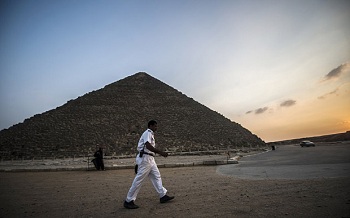Egyptian government officials announced a series of measures to improve tourist security, after two attacks on hotels since the beginning of the year.
Authorities will spend 250 million Egyptian pounds – more than £22 million GBP – on more CCTV cameras, sniffer dogs and X-ray machines at tourist resorts, to be installed within “a few weeks”. The measures come as part of a plan to shore up the country’s flagging tourism industry, which has seen visitor numbers plummet due to political instability and attacks claimed by Isil and other terror groups.
Future visitors should expect more X-ray machine stops, surveillance cameras and metal detectors at the resorts of Sharm el Sheikh and Hurghada. Hisham Zaazou, Egypt’s Minister of Tourism, said that public security camera numbers at Sharm el-Sheikh will be doubled from around 100. He admitted that hotel occupancy was “extremely bad” – around 15 per cent – at the Red Sea complex, which is currently off limits to Britons following the crash last October of a Russian aeroplane that had taken off from the resort. He said the security plan also included “sniffer dogs in resorts, and training for local staff,” and hotels’ surveillance camera networks linked up to government CCTV control rooms.
Egypt has hired an outside security firm called Control Risks to assess its airports in the hope that European governments will lift the ban on flights and hopes to achieve “the gold standard in all our airports,” according to Mr Zaazou.
Various parts of Egypt were placed off limits to tourists during the 2011 revolution that toppled former dictator Hosni Mubarak, while the coup that brought current leader Abdel Fattah el-Sisi to power was surrounded by further insecurity and tension.
Jihadi groups in the Sinai peninsula continue to pose a threat to Egyptians and tourists, attacking a bus at the coastal resort of Taba in 2014, killing four people, while the Western Desert region was placed off limits to tourists because of bandits and the porous border with Libya, where Isil is known to operate.








